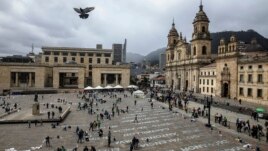15 January 2020
The killings of a "staggering number" of social activists in Colombia has caused concern at the United Nations human rights agency.
The office of the U.N. High Commissioner for Human Rights said Tuesday that 107 human rights defenders were killed in 2019 in the country. An additional 13 killings could be added to that number after investigations are complete.
In addition, 10 human rights activists have been killed in the first 13 days of January.

FILE - Activists who have received death threats display the names of killed leftist activists as part of an art installation by Colombia artist Doris Salcedo at Plaza Bolivar in downtown Bogota, Colombia, June 10, 2019.
A spokesperson for the high commissioner, Marta Hurtado, said the repeated "violence and impunity must stop."
Most of the reported deaths have taken place in poor rural areas where illegal, armed groups operate. Some of the areas were once controlled by the rebel Revolutionary Armed Forces of Colombia, known as FARC. The rebel group signed a peace deal with the government in 2016.
However, the U.N. has said Colombia has had problems carrying out the details of the peace deal. Illegal, armed groups now occupy territory once controlled by the rebels.
The major peace agreement between rebels and the government ended more than 50 years of conflict. It called for greater security in distant areas where illegal drug traffic exists. The government has built new roads and helped farmers substitute crops used to make illegal drugs.
Hurtado said the U.N. recognizes steps to help people living in affected areas. "However, the number of killings clearly shows much needs to be done," she said.
More than half of the killings took place in four states: Antioquia, Arauca, Cauca and Caqueta. The violence has targeted people pushing for the rights of specific community, ethnic, indigenous and Afro-Colombian groups.
Worrying developments
The U.N. is calling on the government of President Ivan Duque to increase efforts to improve security. It also has called for increased health and education services.
Duque was elected in 2018 voicing criticism of the peace deal with rebels. However, he has not been able to reform important parts of the agreement.
The Kroc Institute for International Peace Studies at the University of Notre Dame in the U.S. state of Indiana observes how the terms of the peace deal are being met. In a study from last April, the group said that the government had started to carry out more than two-thirds of the promises detailed in the agreement. The study found that progress was at a level similar to other two-year-old peace agreements around the world that the group had studied.
Special Representative Carlos Ruiz heads the U.N. Verification Mission in Colombia. He told the U.N. Security Council this week that important steps have been made. But he added that continued violence in some areas remains a problem.
He said he was worried about territorial disputes between illegal, armed groups in Choco state in recent weeks.
Ruiz also noted the recent death of Lucy Villarreal. She was an activist killed after completing a children's workshop in the port city of Tumaco. Violence has broken out in the city between rebels.
Ruiz said fulfilling the peace deal's requirements holds the best hope for Colombia's future. Peace will not fully be gained "if former combatants who laid down their weapons and are committed to their reintegration continue to be killed," he added.
I'm Mario Ritter Jr.
Mario Ritter Jr. adapted this Associated Press story for VOA Learning English. Hai Do was the editor.
_______________________________________________
Words in This Story
staggering –adj. very large, shocking or surprising
impunity –n. freedom from punishment or loss
reintegration –n. to be brought again into a group that you were once part of
indigenous –adj. someone who is from a place and native to it